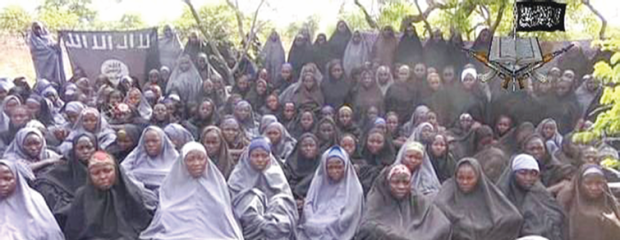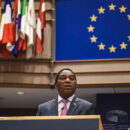Nigeria’s Boko Haram ceasefire deal: too good to be true? – By Andrew Noakes

 Last week, a colleague forwarded me an email purportedly written by Abubakar Shekau, the leader of Boko Haram. Addressed to the International Criminal Court and penned in perfect English, it made the outlandish claim that Nigeria’s President Jonathan has been a key sponsor of the Boko Haram insurgency all along. It even claimed many of Boko Haram’s attacks have actually been carried out by the government.
Last week, a colleague forwarded me an email purportedly written by Abubakar Shekau, the leader of Boko Haram. Addressed to the International Criminal Court and penned in perfect English, it made the outlandish claim that Nigeria’s President Jonathan has been a key sponsor of the Boko Haram insurgency all along. It even claimed many of Boko Haram’s attacks have actually been carried out by the government.
Even aside from its unbelievable claims, the email bore all the hallmarks of a fake – written in English, the language of the insurgency’s Western enemies, and referring throughout to “Boko Haram”, a name the group itself eschews in favour of Jama’atu Ahlis Sunna Lidda’Awati Wal-Jihad (People Committed to the Propagation of the Prophet’s Teachings and Jihad).
As news of Nigeria’s ceasefire deal with Boko Haram has been making headlines around the world, the email reminded me there are two insurgencies in Nigeria. There’s the real insurgency that has claimed the lives of thousands of Nigerians, and then there’s the insurgency that exists in the minds of much of Nigeria’s political elite, to be unleashed as a tool to gain political advantage over their opponents. As the real Boko Haram continues to terrorise the people of Borno, Adamawa, and Yobe states, the other Boko Haram has been busy writing emails to the ICC and, I fear it may transpire, doing ceasefire deals.
As we inch closer to the February 2015 presidential election, using the insurgency for political gain has become an increasingly common tactic. Whoever wrote that fake email wanted to smear President Jonathan’s ruling People’s Democratic Party (PDP). And it also looks very possible that the ceasefire deal is a product of political intrigue rather than a reflection of reality.
I hope I’m wrong. It would be a truly extraordinary achievement if the government has been able to persuade Boko Haram to cease their attacks and return the Chibok girls to their parents. An end to the violence and the safe return of the girls is what we are all aiming for. But, sadly, there is now strong reason to believe the deal could be fake.
On the ground, it seems to have had no effect. Since the deal was announced, Boko Haram have carried out a series of attacks. As well as raiding a string of villages, they are reported to have assaulted the strategic town of Damboa in Borno state – a town that had been re-taken by the army after it fell to insurgents in July.
The mystery of Danladi Ahmadu, Boko Haram’s “representative” during the ceasefire talks, is also cause for concern. According to journalist Ahmad Salkida, who has a history of close contact with the group, Ahmadu is an imposter. Salkida, who knows most of Boko Haram’s leading figures by their first names, has said he’s never heard of Ahmadu. Other sources familiar with the group have also expressed doubts about his claim to be a leading figure. It seems he is either completely bogus, or representing a little-known faction in the insurgency – and Salkida has been quick to dismiss the latter option.
All this begs the question, why would the Nigerian government announce a ceasefire deal with someone who has such little credibility? And the answer brings us back to politics. Since the Chibok girls were kidnapped, the #BringBackOurGirls campaign has increasingly been a thorn in the side of President Jonathan and the PDP. The debacle of the government’s seemingly negligent response to the abduction caused such a political storm in Nigeria and such damage to the country’s international reputation that the government has reportedly paid American PR firm Levick $1.2 million to rehabilitate its image. Though the firm has done a fairly impressive job so far, the regular street protests calling for the return of the girls still cause the government considerable embarrassment.
President Jonathan seems determined to run again for the presidency in February. Though the smart money says he’ll win, it won’t necessarily be easy. His popularity in the north – never very high to begin with – has suffered because of the insurgency and because many feel it’s time for a northern PDP candidate to take the helm. Added to this is the controversy surrounding Chibok. Under Nigeria’s constitution, Jonathan needs to win one quarter of the votes in two-thirds of the states, meaning he needs at least some northern support to get over the finish line. In short, if he’s going to run then he needs an answer to the #BringBackOurGirls campaign.
So when Chadian President Idriss Déby revealed he had been contacted by Ahmadu, supposedly representing Boko Haram, the president must have sensed a political opportunity. To announce his candidacy on the back of a ceasefire deal and the return of the Chibok girls would have been a political coup of the highest order. At once silencing his critics and proving his diplomatic and strategic skill, Jonathan would have been set for an easy win in February.
Is it possible the political opportunity was so great that the government couldn’t resist gambling on a man who seemed to have little credibility? Did they just take him at his word – almost knowingly being duped, but desperately hoping that it might all be true?
In a country where fake emails are sent on behalf of terrorist leaders in order to smear political opponents, where rumours abound about elections being cancelled in states that are likely to vote for the opposition, and where legislators have shown themselves willing to block $1 billion in desperately needed funding for the military just to embarrass the government, such a thing is certainly possible.
I hope that I’m wrong. I hope that the deal is real, that news will filter down to Boko Haram fighters on the ground and the violence will stop, and that Shekau will release a new video declaring his agreement. Above all, I hope the Chibok girls will soon be set free.
Whatever the truth turns out to be, one thing is certain: the politicisation of the Boko Haram insurgency has become a major hindrance in the fight against terrorism in Nigeria. Partisan calculations should never be a major consideration in a counter-insurgency campaign, and yet as the election draws nearer they seem to have become one of the most prominent drivers of action. If President Jonathan declares his candidacy, the first thing he should do is sit down with the APC candidate and issue a joint declaration that partisan politics has no place in the effort to tackle Boko Haram.
Andrew Noakes is a campaigner, counter-terrorism expert, and security adviser. He is Coordinator of the Nigeria Security Network and CEO of Frontier Intelligence. Find him on twitter @andrew_noakes.







The name ‘Danladi Ahmadu’ is a name no self respecting Boko Haram leader will use, even as a nomme de guerre. The name is completely Hausa with traces of paganism and from what we have seen the bulk of Boko Haram leadership are of the Kanuri tribe hence their activities in the North eastern part of the country. A wonder why the government allowed itself to be conned.